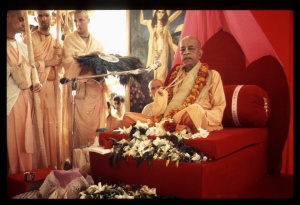SB 8.8.2

A.C. Bhaktivedanta Swami Prabhupada
TEXT 2
- tām agni-hotrīm ṛṣayo
- jagṛhur brahma-vādinaḥ
- yajñasya deva-yānasya
- medhyāya haviṣe nṛpa
SYNONYMS
tām — that cow; agni-hotrīm — absolutely necessary for the production of yogurt, milk and ghee to offer as oblations in the fire; ṛṣayaḥ — sages who perform such sacrifices; jagṛhuḥ — took in charge; brahma-vādinaḥ — because such sages know the Vedic ritualistic ceremonies; yajñasya — of sacrifice; deva-yānasya — which fulfills the desire to be elevated to the higher planetary systems and to Brahmaloka; medhyāya — fit for offering oblations; haviṣe — for the sake of pure clarified butter; nṛpa — O King.
TRANSLATION
O King Parīkṣit, great sages who were completely aware of the Vedic ritualistic ceremonies took charge of that surabhi cow, which produced all the yogurt, milk and ghee absolutely necessary for offering oblations into the fire. They did this just for the sake of pure ghee, which they wanted for the performance of sacrifices to elevate themselves to the higher planetary systems, up to Brahmaloka.
PURPORT
Surabhi cows are generally found on the Vaikuṇṭha planets. As described in Brahma-saṁhitā, Lord Kṛṣṇa, on His planet, Goloka Vṛndāvana, engages in tending the surabhi cows (surabhīr abhipālayantam (BS 5.29)). These cows are the Lord's pet animals. From the surabhi cows one can take as much milk as one needs, and one may milk these cows as many times as he desires. In other words, the surabhi cow can yield milk unlimitedly. Milk is necessary for the performance of yajña. Sages know how to use milk to elevate human society to the perfection of life. Since cow protection is recommended everywhere in the śāstras, the brahmā vādīs took charge of the surabhi cow, in which the demons were not very interested.